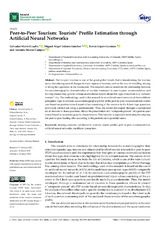Peer-to-Peer Tourism: Tourists’ Profile Estimation through Artificial Neural Networks
Autor
Moral Cuadra, Salvador
Solano Sánchez, Miguel Ángel
López-Guzmán, Tomás
Menor-Campos, Antonio
Editor
MDPIFecha
2021Materia
Sharing economyCollaborative tourism
Tourist profile
Peer-to-peer accommodation
Artificial neural networks
Multilayer perceptron
METS:
Mostrar el registro METSPREMIS:
Mostrar el registro PREMISMetadatos
Mostrar el registro completo del ítemResumen
Peer-to-peer tourism is one of the great global trends that is transforming the tourism sector, introducing several changes in many aspects of tourism, such as the way of travelling, staying or living the experience in the destination. This research aims to determine the relationship between the sociodemographic characteristics of tourists interested in peer-to-peer accommodation and the importance they give to various motivational factors about this type of tourism in a “cultural-tourism” city. The methodology used in this research is an artificial neural network of the multilayer perceptron type to estimate a sociodemographic profile of the peer-to-peer accommodation tourist user based on predetermined input values consisting of the answers to the Likert-type questions previously carried out using a questionnaire. Thus, the model developed, through a customized set of answers to these questions, allows the presentation of a “composite picture” of a peer-to-peer tourist based on sociodemographic characteristics. This function is especially interesting for adapting the peer-to-peer hosting offer according to the preferences of potential users.

